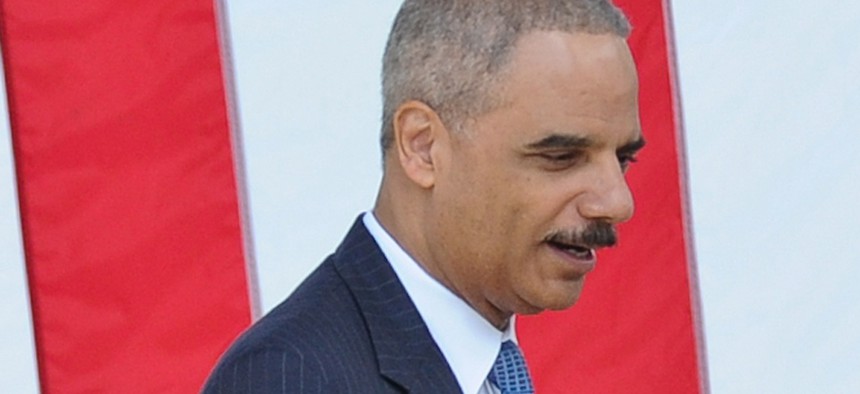
Defense Department file photo
Eric Holder Keeps Chipping Away at ‘The War on Drugs’
In his last days in office, the attorney general is still making sweeping changes to national justice policy.
Attorney General Eric Holder effectively gutted a national policy Friday called equitable sharing—a policy that for decades has allowed law enforcement to seize billions of dollars from criminal activities.
Under the policy—often called civil forfeiture—law enforcement has been able to channel drug money, stolen vehicles, and even real estate, back into their budgets. The policy was set up as an incentive for good police work. But it has become susceptible to abuse, with law enforcement seizing assets from law-abiding citizens.
It's another example of how Eric Holder, whose departure from the Justice Department is pending the confirmation of his replacement, may just become President Obama's most lasting domestic-policy legacy. During his tenure, Holder has been chipping away at "war on drugs" era policies—such asreducing mandatory minimum sentences for drug crimes and not challenging states for enacting marijuana legislation. The intended effect is to combat the mass, disproportionate incarceration of blacks in the nation's prisons.
Civil forfeiture is a component of that chipping away. The program was set up to encourage local forces to make drug stops. Abuses of the program inflict the most harm on the people without the means to mount legal battles in order to get their stuff back.
States may still allow civil forfeiture under their own laws, and Holder's decision does not impact the seizure of illegal firearms, ammunition, or other weapons. It prohibits officers from taking property without evidence of a crime.
In many cases, local authorities seize the assets and hand them over to the federal government, which would then split the bounty. Holder's new policy makes it clear: States cannot use federal law to make such seizures anymore. "With this new policy, effective immediately, the Justice Department is taking an important step to prohibit federal agency adoptions of state and local seizures, except for public safety reasons," Holder said in a statement Friday.
In 2013, Sarah Stillman collected dramatic examples of civil forfeiture for an eye-opening New Yorkerstory. In it, she describes motorists being pulled over for minor traffic offenses and having their money or jewelry taken away from them, the parents of a small-time pot dealer having their home seized, and how some police forces derive the majority of their budgets from such seizures.
The policy will shake the status-quo in many police budgets across the country. "For hundreds of police departments and sheriff's offices the seizure proceeds accounted for 20 percent or more of their annual budgets in recent years," the Washington Post notes.
But Holder's actions can only go so far, as they do not affect individual state laws. All the assets seized since 2008 are worth $5.3 billion, notes the Post. But local seizures, without the federal government, amounted to $3 billion of that.







